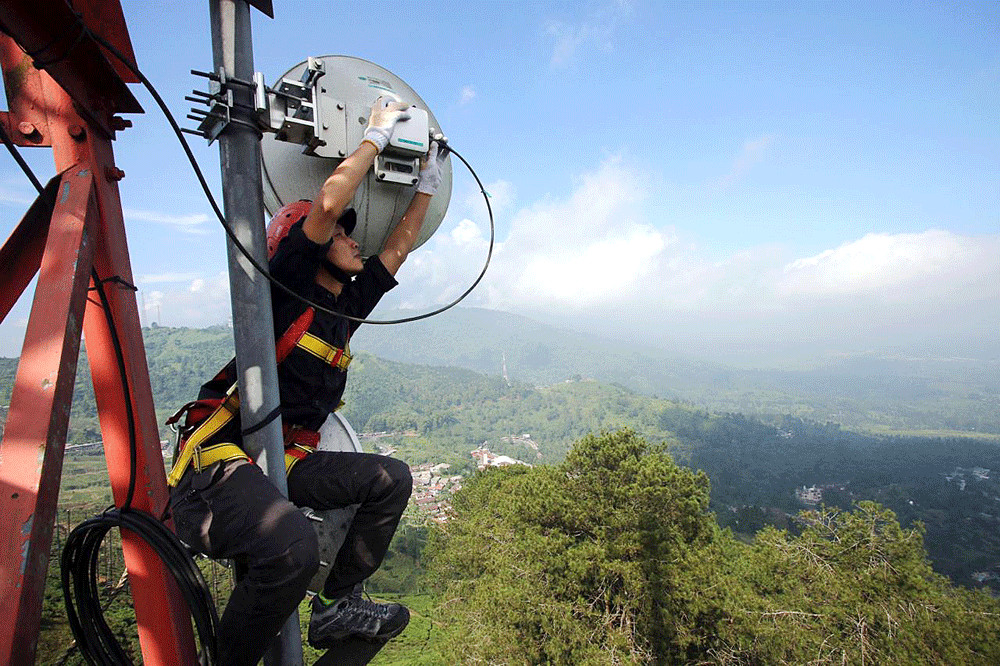Popular Reads
Top Results
Can't find what you're looking for?
View all search resultsPopular Reads
Top Results
Can't find what you're looking for?
View all search resultsCalls, texts... and forecasts? Mobile phone towers can predict rain too
Change text size
Gift Premium Articles
to Anyone
T
hought mobile phone towers were just for calls and messages? They can also help predict rainfall, telecoms experts said on Friday, a potential game-changer for farmers in developing countries such as India and Sri Lanka.
Many emerging economies cannot afford sophisticated forecasting tools such as ground-based radar and rain-gauge networks, making it harder to predict seasonal rains that are the lifeblood for farmers in many Asian countries.
"Weather information - that's the number one need farmers have more than anything else," said Daniele Tricarico, who works on agritech at the mobile communications industry body GSMA.
"We are trying to use very useful mobile operator data to provide better, enhanced services to small-holder farmers for climate resilience," he told the Thomson Reuters Foundation at an agricultural conference in Hyderabad in south India.
Mobile phone towers transmit radio signals that are disturbed when it rains, providing data that enables local weather agencies to improve the accuracy of their rainfall predictions.
The sheer number of mobile phone towers means the data can help provide forecasts of up to 90% accuracy, said Tricarico, filling the equipment gap at no extra cost and giving more location-specific, high-resolution data than satellites provide.
The forecasts can be sent to farmers through calls and text messages, helping them plan when to sow their seeds or use fertilizers, said Damitha Gunawardena, digital inclusion manager at Sri Lanka's largest mobile phone operator, Dialog Axiata.
Read also: Google internet balloon spinoff Loon still looking for its wings
Improved forecasting is key to helping farmers deal with the impact of climate change, which is making weather patterns harder to predict, he said.
According to the World Bank, climate change effects could cost India 2.8% of its GDP and reduce the living standards of nearly half the country's 1.2 billion population by 2050.
"If you talk to any farmer, they'll say climate has been changing so much that they have no idea what to expect any more," said Gunawardena. "And that's making farmers move out of agriculture."
Improved access to data could also encourage greater uptake of crop insurance among small-scale farmers, most of whom are uninsured, he said, providing a crucial safety net as climate change increases the risks around agriculture.
Currently, the most popular insurance schemes in the region are based on satellite imagery or agents visiting fields in person.
Using mobile phone towers would allow insurers to pinpoint where rain has fallen more accurately, said Gunawardena, calling it a "game-changer" for farmers.
In India, where agriculture makes up about 15% of a $2.5 trillion economy, farmers are often on the front lines of climate change impacts - from severe droughts, unpredictable rainfall, frequent floods to powerful cyclones.
The heaviest monsoon rains to lash India in 25 years triggered floods that killed hundreds in late September. It also led to crops being washed away or rotting.
While the United States and some European countries have begun to use mobile phone networks commercially to predict rain, developing nations may take another few years, said Tricarico.
Several hurdles stand in the way, including customizing softwares and algorithms to specific climates, regulatory permissions and chalking out business models, he said.
In January, Boston-based ClimaCell partnered with Mumbai-based charitable foundation Tata Trusts with the aim to start such a service in India.
Pilot projects are under way in Nigeria, Sri Lanka and Bangladesh.
"Results have been promising so far. And since we know it can be done, it's only a matter of time," said Dialog's Gunawardena.











